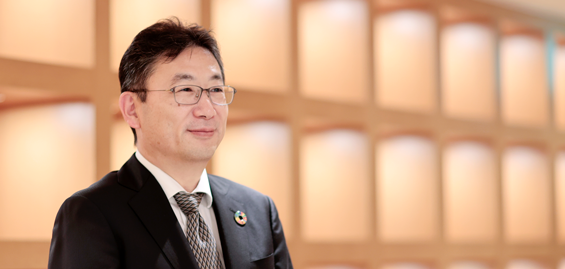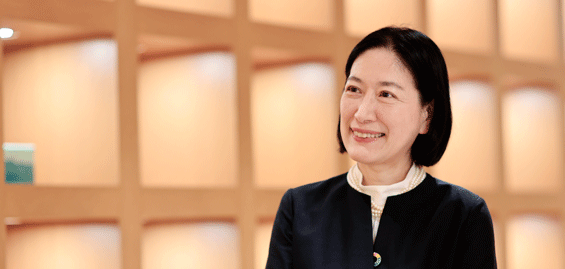Discussion: Human Capital Initiatives
This interview was originally published in the ROHM Group Integrated Report 2023.
Our efforts for securing and developing the ideal human capital for achieving our goal of becoming a major global player by 2030
Inoue
I have been involved in personnel affairs for a long time at foreign-owned companies and international institutions, and currently teach subjects such as human resource management, leadership, and organizational management at university. Based on this perspective, I find it fantastic that ROHM declares to “search extensively for capable human resources and cultivate them as cornerstones for building long-term prosperity” in its Basic Management Policy. As mentioned by Mr. Tateishi, I believe it is extremely important to foster a culture and environment that enables global talent to develop, and think it is important that we continue with our current successful initiatives. I also think it is necessary to build a human capital portfolio based on our management strategy. Another thing that is important is to identify important and strategic positions for becoming a major global player and clarify where and when people with the required skills are needed and how many are needed, visualize where such human resources are to be found and match them with the right positions in Japan or overseas, and convey our ideal for global talent to all of our employees.
Tateishi
The reason why an environment for cultivating human capital is important is because workers will leave a company if they do not feel happy there. To become a company that cultivates and retains global talent means that we must foster a corporate culture that tolerates different ways of thinking and different cultures. Furthermore, to be a global company means that our organizations in Japan must interact and cooperate with our organizations overseas in an appropriate manner. In our director discussions, we are currently considering personnel reshuffling to promote human resource development and job rotation to enable our young employees to actively gain experience working overseas.

Inoue
I believe it is important that our employees feel satisfaction in their daily jobs at the Company. However, employee values are diversifying, and there is no one-size fits-all approach to achieve job satisfaction. For example, if we compare Japan and other countries, many overseas companies have job-focused employment, where all employees generally focus on a particular field and aim to become highly-specialized human capital. If we are to become a major global player, we must cultivate specialization that enables us to compete with such highly-specialized human capital at other overseas companies in the same industry. I fear that we may not be able to compete by using the type of system often found at Japanese companies, which aims to cultivate generalist human capital via job rotation.
Tateishi
I think that is certainly the case with generalists. However, even overseas companies have advanced technical experts with a wide range of knowledge that play a role in linking specialists with other specialists. Having such generalists that can strengthen horizontal connections organically binds the organization and increases work efficiency. Because ROHM already has such human capital, I think that we can create a robust organization by increasing our numbers of highly-specialized technical human capital experts. To accelerate the development of such experts, we introduced a “specialist system” in FY2019. This system also promotes work style diversification by enabling employees to select their own career path from multiple options. By enabling them to make their own choices, we are aiming to achieve a workplace environment with better job satisfaction. If this system can increase the number of experts in the Company, then I believe that we will be able to achieve an organizational system that can immediately place specialized human capital in optimal positions when we recruit them from overseas or other companies.
Inoue
As technology develops and the fields of engineers become more specialized, I believe that remaining at the forefront of those fields will become even more important. I hope that the specialist system of ROHM will enable us to cultivate highly-specialized human capital that can compete with human capital both in Japan and overseas. Also, since more importance is placed on one’s academic history overseas than in Japan and the acquisition of doctorates is seen as proof of someone being highly-specialized, I believe that ROHM must provide support for obtaining doctorates and promote the recruitment of human capital with doctorates.

Field Application Engineer. An engineer that provides technical support on products and applications to customers.
Cultivating a corporate culture that encourages endeavors
Tateishi
ROHM has never been a company that values conformity. Our management encourages employees to take on challenges to strengthen their specialization and provide support systems as a company. However, when compared to overseas human capital such as in China or India, I think that human capital in Japan is less enthusiastic and not as serious about specialization, for cultural reasons. When I talk with overseas employees, I am surprised by how highly conscious of their career they are. It seems like they are constantly thinking about how they can promote their own identities by strengthening their expertise.
Inoue
I agree that overseas, there are many people who confidently assert their own opinion when it differs from those around them. This may be because they think they can make a different contribution to other people due to differences in experience and ways of thinking. Well, this is exactly what diversity is, but in order to successfully bring together such diverse opinions, we also need the power of inclusion, so that we can leverage their strengths and turn it into organizational capability. I believe that leaders who promote global management need the ability to bring together human capital with highly-specialized knowledge as a team, even if they do not personally have the same level of knowledge.
Tateishi
One other thing I have realized is that innovation comes from discontinuous technologies. Revolutionary technologies are not simply an extension of conventional technologies, and are somehow disconnected. We need a culture that allows human capital with such technologies and viewpoints to make failures. At the same time, we of course need human capital that will develop extensions to existing products based on conventional technologies, and I believe that we need a good balance of both when we consider our research and development.
Inoue
I have high hopes for human capital that is open to as-yet-unencountered technologies and different cultures, and who can take in an interest in such things and think about them creatively. As Mr. Tateishi said, I think we need to cultivate an attitude that recognizes that discontinuous technologies are required for innovation.
Tateishi
Because of the culture in Japan that favors homogeneity, it may indeed be good to start from fostering the right attitude. To increase employee engagement, it is important to carefully explain the direction of the Company and gain understanding and empathy. If employees empathize with that direction, they will achieve self-realization by contributing to the growth of the Company, and I believe that recognizing those achievements and contributions will lead to better engagement.
Inoue
I believe that we are placing importance on understanding and empathy, and recognizing their contribution, no matter where people work. If this can make our employees fond of ROHM and talk about how it is a good company, this will create synergy, and if this synergy propagates overseas, then I think we will truly become a major global player.

Tateishi
In order to become a major global player, I believe it is important that we foster a culture and environment that enables global talent to naturally develop. ROHM is trying to become ONE ROHM together with our many overseas affiliates. This means that we must create an environment where our sales organizations in Japan and overseas can conduct work on an equal basis as members of the same team and FAEs* in Japan can cooperate with developers and technicians overseas as part of the same team. I also hope that we can continue efforts for sending human capital back and forth between Japan and overseas affiliates, so that we can cultivate global talent that is unbound by regional borders.